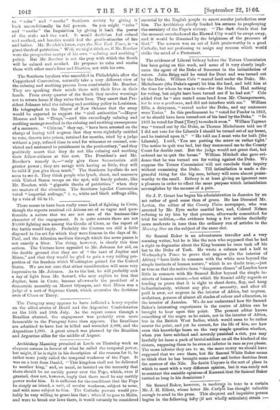The Southern loyalists whO assembled in Philadelphia after the Copperhead
Convention, naturally take a very different view of the calming and soothing process from comfortable Mr. Beecher. They are speaking their minds there with their lives in their hands. From every quarter of the South they receive warnings not to return home if they value their lives. They assert that Pre- sident Johnson tried the calming and soothing policy in Louisiana. He telegraphed to the Mayor of New Orleans that the army would be expected to support the " civil authorities "—Mayor Monroe and his "Thugs,"--and this exceedingly calming and soothing message resulted in the calming and soothing consequence of a massacre. " Citizens," they say, " have been arrested on the charge of having told negroes that they were rightfully entitled to vote, thrown into prison, retained for months, tried by a judge without a jury, refused time to send for witnesses or counsel, con- victed and sentenced to punishment in the penitentiary," and they positively assert that they do not like calming and soothing their fellow-citizens at this cost. The President's and Mr. Beecher's remedy is,—" only give these Secessionists still greater power ; they are savage with having so little, they will be mild if you give them much." The Southern loyalists do not seem to see it. They think people who lynch, shoot, and massacre with United States troops on the spot, will barely pulsate, like Mr. Beecher, with " gigantic throbs of patriotism " when they are masters of the situation. The Southern loyalist Convention voted " impartial suffrage," i. e., white and black suffrage alike, by a vote of 66 to 11.






























 Previous page
Previous page